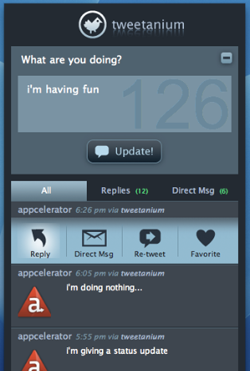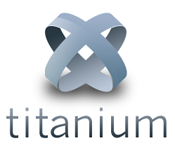Mountain View-based startup Appcelerator has raised $4.1 million in a Series A round led by Storm Ventures. The money will go primarily towards the development of an open source competitor to Adobe AIR, which enables web developers to create applications that look and function more like desktop programs.
The first version of Appcelerator’s RIA platform, dubbed Titanium, is being released today for developers on Windows and Mac OS. Appcelerator is also releasing a few demo applications, such as a Twitter client named Tweetanium and a YouTube media player called Playtanium (both shown in the video below). I’ve tested the Tweetanium client and it does indeed operate like AIR clients such as Twhirl and Alert Thingy, albeit with far fewer features.

One of the convenient aspects of Titanium is that its applications don’t have to require a separate installation of the Titanium runtime environment. If you wanted to install an Adobe AIR application – or activate any of the advanced functionality provided by other RIA environments such as Google Gears – you must install either an executable or a plugin first. But with Titanium, developers can opt to incorporate Titanium’s runtime environment into their applications so they can be downloaded and installed just like any other desktop program. (Update: As Ryan Stewart points out below, AIR developers can indeed “bundle the AIR runtime with any application” as well).
Appcelerator is leveraging a slew of technologies (C, C++, Objective C, Win32, Chromium, Webkit, Cocoa, etc.) to build out its suite of desktop capabilities, which include background notifications, native windowing, file system access, geo-location and offline storage. Titanium also relies on a forked version of Google Gears for about 45% of its APIs, which are based primarily in JavaScript.
Founded about two years ago, Appcelerator has generated revenue thus far through its SDK, which assists web developers with both their front and back-end programming projects. The company has enticed about 3,000 members into its developer community, which launched last March. Its work on Titanium began in earnest at the beginning of this year, and later versions of the platform will assist in the development of native mobile applications (for presumably iPhone and Android) in addition to desktop apps.
